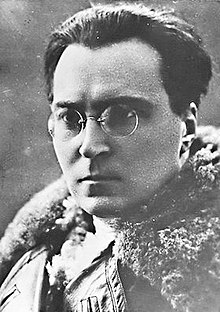You can help expand this article with text translated from the corresponding article in French. (April 2024) Click [show] for important translation instructions.
|
Victor Serge | |
|---|---|
 | |
| Born | December 30, 1890 Brussels, Belgium |
| Died | November 17, 1947 (aged 56) Mexico City, Mexico |
| Nationality | |
| Political party |
|
| Spouse | Liuba Russakova |
| Partner | Laurette Séjourné |
| Children | 2, including Vlady |
| Signature | |
 | |
Victor Serge (French: [viktɔʁ sɛʁʒ]; December 30, 1890 – November 17, 1947), born Victor Lvovich Kibalchich (Russian: Ви́ктор Льво́вич Киба́льчич), was a Russian writer, poet, Marxist revolutionary and historian. Originally an anarchist, he joined the Bolsheviks five months after arriving in Petrograd in January 1919 and later worked for the Comintern as a journalist, editor and translator. He was critical of the Stalinist regime and remained a revolutionary Marxist until his death. He was a close supporter of the Left Opposition and associate of Leon Trotsky.[1] According to William Giraldi, Serge's novels may be "read like an alloy of" George Orwell and Franz Kafka: "the uncommon political acuity of Orwell and the absurdist comedy of Kafka, a comedy with the damning squint of satire, except the satire is real."[2] In his studies of Serge, Richard Greeman described him as a Modernist writer influenced by James Joyce, Andrei Bely and Freud; Greeman also believed that Serge, although writing in French, continued the experiments of such Russian Soviet writers as Isaac Babel, Osip Mandelstam and Boris Pilnyak and poets Vladimir Mayakovsky and Sergei Yesenin.[3] He is remembered as the author of novels and other prose works, memoirs (e.g. Memoirs of a Revolutionary) and poetry. Among his novels chronicling the lives of Soviet people and revolutionaries and of the first half of the 20th century, the best-known is The Case of Comrade Tulayev (French: L'affaire Toulaev). Nicholas Lezard calls the novel " of the great 20th-century Russian novels" that follows the traditions of "Gogolian absurdity".[4]
- ^ Weissman, Susan (April 15, 2014). Victor Serge: A Political Biography. Verso Books. pp. 1–30. ISBN 978-1-78168-957-8.
- ^ Giraldi, William (May 25, 2015). "Victor Serge, the Unconquered". The Baffler.
- ^ Greeman, Richard (1980). "Victor Serge's The Case of Comrade Tulayev". Minnesota Review. 15 (1): 61–79. Project MUSE 427121.
- ^ Lezard, Nicholas (September 18, 2004). "Run over by history". The Guardian.